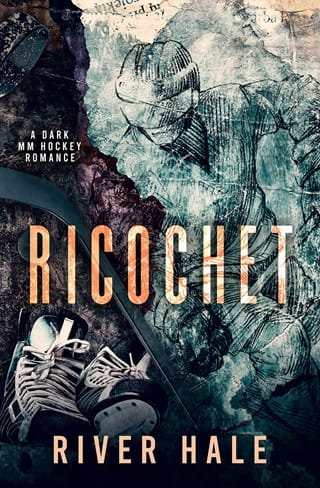Chapter 7
7
I called Grey on my walk to school and again between each of my classes, already knowing it would go to voicemail. I checked Find Friends—Vivi and Cate were both at home—but Grey’s location came back as unavailable. I was distracted in class, refreshing Instagram and Facebook to see if she’d posted anything new.
By lunchtime, I wondered if JJ might just let me get away with the sin of having Vivi for a sister. Justine had ignored me in English, and I hadn’t yet seen Jennifer—and then, when I sat down to eat, I found the picture. A piece of printer paper had been folded twice and slipped into my backpack. On it was a medieval image of three women burning at stakes, their hands clasped behind them in irons as flames licked at their toes. Their faces had been digitally altered to look like my sisters and me. There was no accompanying note, though the message was loud and clear.
You will burn.
I sighed. My first instinct was to throw it away or take it to a teacher. Instead, I folded it up and put it back in my bag. Grey would like it, would probably find it funny, would appreciate the artistry that had gone into making the burning women look like us. It was the kind of thing she would have framed and hung on her bedroom wall when she was my age.
I picked up my phone to call her, forgetting, for a moment, that she was unlikely to answer. Instead, I called Vivi for an update, but her phone rang and rang and rang. When her avatar disappeared from Find Friends a few minutes later, I was left with a panicky feeling in my stomach that whatever had happened to Grey had happened to Vivi too.
I cut class for the second day in a row and jogged home through the spitting rain. When I got there, Cate’s car was gone and the house was shut up, dark.
“Vivi?” I called when I unlocked the front door.
No answer.
“Vivi?!”
“Up here!” she answered. “In Grey’s room!”
I ran up the stairs, my heart thrashing. Vivi was in Grey’s old empty bedroom, sitting on the floor with Sasha in her lap and the Vogue magazine open in front of her.
“How did you get in here?” I asked, breathless. “The door has been locked for years.”
“Grey’s gone, Iris,” she said without looking up at me.
Lightning flashed outside. Thunder followed a moment later, stuttering through the house and making the window glass jitter. My hair was wet and my teeth were chattering from the cold. Cate told me that the three of us were all born in the middle of storms. Grey was lightning, Vivi was thunder, and I was the sea in a tempest. Grey had always hated storms, but Vivi loved them. When a second curl of thunder crawled in through the open window, I wondered if she’d somehow summoned it.
“What do you mean, Grey’s gone?” I asked.
“I talked to her agent, her manager, her publicist, the photographer she was supposed to shoot with yesterday. I talked to her friends in Paris and London. I talked to her doorman. No one has seen or heard from her in days.” Vivi held up the latest Vogue, the one I’d hidden under my pillow to save it from my mother. “Have you read this?”
“A couple of paragraphs, but—”
“Read some more.”
“There are more important—”
“Seriously, read it.”
“What am I looking for?”
“Oh, you’ll know it when you see it.”
I opened the magazine and picked up where I left off.
New Year’s Day marked the ten-year anniversary of one of the world’s most enduring modern mysteries: the disappearance of the Hollow sisters. On a quiet street in Edinburgh, three little girls vanished right out from under their parents’ watchful gaze. Then, exactly one month later, they came back, to the very same street they were taken from. They were naked and carried nothing with them but an antique folding hunting knife. They had no serious injuries nor signs of sexual assault. They weren’t dehydrated or malnourished. All three of them bore a fine half-moon incision at the base of their throats, nestled in the crook of their collarbones, that had been stitched closed with silk thread. The wounds were healing nicely.
No one has been able to say where they went or what happened to them—not even Grey Hollow, the eldest of the three. She was eleven at the time, certainly old enough to remember snippets of her experience, though she refused to give a statement to Scottish police and has never spoken publicly about her suspected kidnapping.
Conspiracy theories abound, the most popular of which are alien abduction, parental hoax, and (perhaps because of the Celtic setting) fairy changelings.
There were several large out-of-court settlements from news organizations that had falsely accused the girls’ parents of being involved in their disappearance. The funds went toward enrolling the three sisters in Highgate School for Girls, a lavishly expensive day school that counts famous actors, poets, and journalists among its alumni. One of the Old Girls recently married into an extended branch of the royal family. The grounds are green and expansive, the main building a timber-framed Tudor mansion with wisteria growing thick on the facade. Grey Hollow struggled to thrive there.
A series of family tragedies followed in the ensuing years, the most devastating of which was a Capgras delusion—Hollow’s father, Gabe, reportedly believed his children had all been replaced by identical impostors. After two years in and out of psychiatric institutions, he killed himself when Grey was thirteen.
Little more is known about her teenage years, but at seventeen, she had a falling-out with her mother and found herself homeless. She dropped out of high school, moved into a one-bedroom apartment in Hackney with three other girls, and tried her hand at modeling. Within six months of leaving home, she’d walked for Elie Saab, Balmain, Rodarte, and Valentino. Within two years, she was the highest-earning supermodel in the world. Now, at the age of twenty-one, Hollow is the owner of and head designer at House of Hollow, whose creations have become some of the most sought-after in the industry after the label’s launch at Paris Fashion Week just under eighteen months ago.
One of the first things I tell her is that stitching bits of paper into her creations reminds me of another infamous unsolved crime: the mystery of the Somerton man. In 1948, an unidentified man was found dead on a beach in Australia. All the labels had been cut from his clothing, and police later found a tiny scroll of rolled-up paper sewn into his pants pocket. It read “Tamám Shud,” which means “finished” in Persian. The words had been torn from the final page of the Rubáiyát of Omar Khayyám.
“That’s where I got the initial inspiration from,” Hollow says eagerly as she wraps her long fingers—preternaturally dexterous, like she’s a seamstress who’s been working for a hundred years—around a cup of unsweetened Ceylon tea. Her voice is surprisingly deep, and she rarely blinks. With white-blond hair, black eyes, and a smattering of freckles across her nose year-round, she is the definition of ethereal. I have interviewed many beautiful women, but none so truly otherworldly. “As a child I was obsessed with mysteries—probably because I was one.”
I’m under strict instructions from her publicist not to ask her about the missing month, but since she was the one who brought it up, I press my luck.
Does she really not remember anything?
“Of course I remember,” she says, her ink-drop gaze holding mine. Her smile is slight, sly; the same mischievous pixie grin that has made her famous. “I remember everything. You just wouldn’t believe me if I told you.”
The article continued, but I came to a snap stop at that line, the line that Vivi had no doubt been talking about: Of course I remember. I remember everything.
You just wouldn’t believe me if I told you.
The words sank into me like acid, dissolving my flesh. I snapped the Vogue shut and sat on Grey’s bare bed, my hand pressed over my mouth.
“Yeah,” Vivi said heavily.
“That cannot be true.”
When I was seven years old, I vanished without a trace for a whole month.
On the very rare occasion she drank enough wine to talk about it, my mother emphasized the impossibility of it. How we were walking through the warren of lanes of Edinburgh’s Old Town, back to our father’s parents’ house. How we were there one moment, then gone the next. How she took her eyes off us for a second or two, long enough to peck our father on the cheek when the New Year’s fireworks began. How she heard nothing, saw no one—simply looked up to find the street before her empty. A lace-fine snow was falling through the air, the kind that melts when it hits the sidewalk. The alleyway was lit by oily slicks of light and pops of effervescence from the overhead starbursts.
Where there should have been three children, there were none.
Cate smiled at first; she thought we were playing with her. “Iris, Vivi, Grey, come out, come out, wherever you are,” she sang. We were bad at hide-and-seek, but she always pretended to take forever to find us. No giggles answered her this time. No whispers. Immediately, she knew something was wrong. In her first statement to the police, Cate would say that the air tasted burnt and smelled of wild, wet animal. That the only thing out of place on the street was a handful of fall leaves and white flowers on the stoop of a house that had burned down the month before. That was the first place she looked for us. All that had survived the flames of the fire was a freestanding doorframe, held up by nothing. My mother stepped through it and called our names and wandered from room to room in the shell of burnt-out bricks and rubble, her panic rising.
We weren’t there. We weren’t anywhere. It was like the cobblestones had opened up and swallowed us.
My father, Gabe, when he was alive, filled in the rest of the story. How he called the police less than five minutes after we disappeared. How he banged on the doors of every house on the street, but no one had seen us. How you could hear people calling our names—Iris! Vivi! Grey!—from one end of Old Town to the other, until the sun rose and the searchers went home to rest their throats and hug their sleeping children.
I remembered none of this. Like a language I’d once been fluent in but had long stopped speaking, the memories of what truly happened had faded to threadbare fragments over time and then to nothing at all.
I was grateful for this. I knew what usually happened to kidnapped children. It was better not to know what had been done to us.
My memories began a month later, when a woman found us huddled together at midnight, shivering on the sidewalk of the same street we had disappeared from. Our coats were gone and we were naked in the cold, but apart from that, we were unharmed. Our skin was clean. There were leaves and white flowers in our hair. We smelled of mildew and woodsmoke and milk and death. The police came and took the knife from Grey’s shaking hand and wrapped us in foil blankets and offered us hot chocolate and cake made from dark treacle and spices. I was starving. We all were. We gorged ourselves.
After our medical examinations, we were released to our parents. Cate swept me into her arms and collapsed to the hospital floor in a sobbing heap. Her face was wet with tears and her hair was a greasy nest twisted into a bun at the nape of her neck. She couldn’t speak, could only rock back and forth on the floor, keening into my ear.
It is the first true memory I have of my mother.
Of course I remember.
I remember everything.
You just wouldn’t believe me if I told you.
It had to be a lie. Grey didn’t remember. None of us did. It was a central tenet of our story. We were taken. We came back. None of us knew what happened, and none of us ever would. We were the miracle that parents of all missing children dreamed of. Spat back from the abyss, unharmed and whole.
“I can’t feel her, Iris,” Vivi said. “I can’t feel her.”
“What does that mean?”
“Last night, you talked about the strange things we can do. That’s one of them. I’d forgotten—I haven’t tried to do it for years—but when I woke up this morning and you weren’t there . . . I could still feel you. I followed your footsteps down the stairs to the front door. We’re . . . tethered, or something. We’ve always been able to find each other. In the dark, across town, even over oceans. My feet bring me to you if I want them to.”
I knew what she was talking about. I always knew if Grey or Vivi was calling me without looking at the caller ID. I always knew where I’d find my sisters if I went looking for them—but I assumed the memories of being able to feel them, to find them if I needed to, were things I’d half dreamed as a kid, like breathing underwater or being able to fly.
“But I can’t feel her,” Vivi continued. “Grey is gone—what if whatever happened to us before is happening again? We might be the only ones who can help her.”
“Don’t say that. Don’t even think that, okay? Nothing has happened to her.” I could hear in the pitch of my voice how desperately I wanted that to be true. “We’re not kids anymore. Besides, you heard Tyler last night. She disappears all the time.”
“We have to look for her, Iris.”
“No, I have to go back to school. I have classes, I have tutoring. There’s a titration competition coming up in a month that I haven’t practiced for even once and my Python skills need some—”
“Tell me you think she’s okay, and I’ll drop you at school myself.”
“Vivi . . . this is crazy.”
“Say she’s okay, then. Listen to your gut and tell me you think Grey is okay. Do the thing we can do. Find her.”
“I haven’t tried that for a long time.”
“Do it.”
I let out a long breath and did what Vivi asked me to do. I reached out and tried to find Grey, to feel her, the way I’d been able to as a child, but all that came back was an empty sense of nothingness.
I bit my lip. Was that proof of anything?
“That’s what I thought,” Vivi said. She tapped the Vogue cover. “Grey’s always kept secrets. When we were kids, she used to hide stuff from us. Her diary, money, booze. She’d squirrel everything away under loose floorboards or behind bookshelves. So where would she keep her secrets now?”
I looked around the room. “How did you get in here? Did you pick the lock?”
Vivi shrugged. “The door was open.”
“The only person who has a key to this room is Grey.” I knew that because I’d tried to get in many times since she left, without success. I thought of the open front door yesterday, of the wet footprints that tracked inside, of Sasha outside on the mat.
“What if . . . ,” I started. It was a crazy theory, but we were already talking about crazy things. “What if Grey unlocked the door? What if she was here yesterday? What if she left something for us, something only we would know how to find?”
Vivi snapped her fingers at me. “Now you’re thinking like a Hollow.”
We spent the afternoon combing Grey’s bedroom, excavating for signs of our sister. Vivi found the first: a collection of runes hand-embroidered in emerald thread on the underside of her mattress. I found the second—an annotated page torn from a book of Emily Dickinson poetry rolled up tight inside a curtain rod—and the third.
I was on my hands and knees under Grey’s bed, trailing my fingertips over the baseboard, when my skin caught on a splinter in the wood. A prick of blood welled on my fingertip. I wiped it away on my uniform skirt, then crouched to inspect the offending panel.
“There’s something here,” I told Vivi. A crack in the skirting board. I slipped my fingernails under the wood and lifted. It gave, but not enough. “Get me a knife from the kitchen.”
Vivi was standing over me now. “Why don’t you get it yourself?” she said.
I sighed and turned to give her a seriously? look.
“Sorry. Old sibling habits die hard.”
When Vivi returned with a butter knife, I slipped it into the crack, eased it open.
“You’re going to break it,” Vivi said as she tried to shoulder me out of the way. “Let me do it.”
I stopped and glared at her. “Would you quit it?”
“Fine. Whatever. Just be more gentle.”
“I am being gentle.”
Finally, the wood came away from the wall with a bright pop and clattered to the floorboards. Behind it was a hole in the plasterboard, its edges raw. The exact kind of place Grey liked to keep secrets. “Give me your phone,” I said to Vivi, and she did, the flashlight already turned on. I notched it into the darkness, eager to uncover more of Grey’s mysteries, the same way I had been as a child. My heart was clucking in my throat. The hole was laced with cobwebs. There were no diaries or cash or condoms or little bottles of elderflower gin, which is what we used to find in Grey’s hidey-holes before she left home. There was only a dried white flower, an antique hunting knife, and a brass key with a note attached.
“Now, this is more like Grey,” Vivi said as I handed her the strange treasures. I could sense Grey in them, feel her energy; she had touched them, not so long ago.
On the scroll attached to the key, there was an address in Shoreditch, followed by a message with yesterday’s date:
Vivi, Iris,
First of all, stop going through my private shit. I don’t know how many times I have to tell you. (Okay, fine, this time I was counting on you to go snooping—but still. Not cool.)
I hate to say this, but if you’re reading this, I might already be dead. There is so much I wish I’d told you. Come to the address above. Bring the key. Find the door. Save me.
And if he comes for you—run.
I love you both more than anything.
Grey
P.S. Regarding the knife, as Jon and Arya said:
Stick ’em with the pointy end.
 Fullepub
Fullepub 



